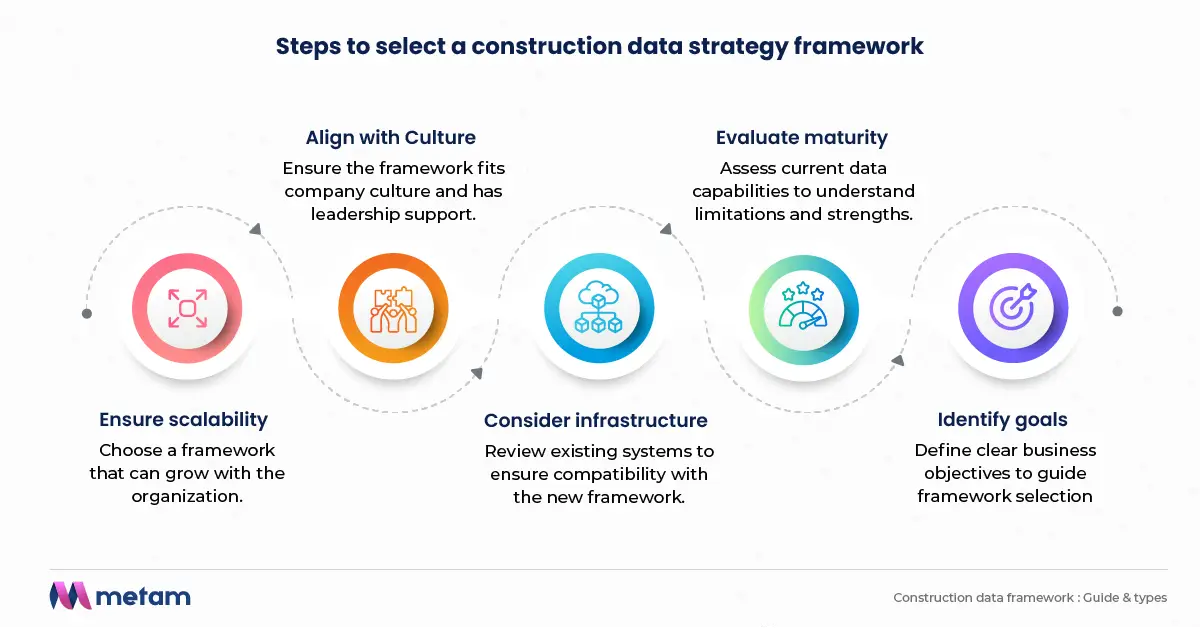
A construction framework structures data strategies to optimize processes and decision-making. Choosing the right framework enhances efficiency, unlocks business potential, and drives better outcomes in the construction industry.
In the construction industry, a solid data strategy framework is not optional, it’s essential. As digital transformation sweeps across sectors, organizations leveraging data effectively are pulling ahead.
According to a recent Forbes report, construction companies with a data-driven culture are 50% more likely to outperform their competitors. Harnessing data effectively can provide a substantial competitive edge.
This guide is your comprehensive resource for understanding and leveraging construction data frameworks. From improving procurement processes to optimizing decision-making, learn how to select the right framework to align with your organization's unique needs and goals.
A construction framework is a pre-established agreement between clients and contractors to streamline the delivery of construction services. It defines essential elements like pricing, timelines, and quality standards, fostering collaboration, cost-effectiveness, and efficiency across projects.A construction framework is more than a contractual arrangement, it’s a strategic tool for project efficiency. By establishing pre-agreed terms, these frameworks optimize collaboration and ensure clarity. Whether managing long-term projects or navigating procurement complexities, leveraging a construction framework reduces risks, cuts costs, and enhances project delivery outcomes.
By integrating data strategy into these frameworks, construction companies can unlock even greater efficiencies and innovative opportunities.
Choosing the right construction data strategy framework involves understanding the different types and models available and how they can address various aspects of data management and utilization. This section provides an in-depth look at some of the most popular frameworks, helping to identify which one aligns best with construction industry needs.
data strategy frameworks come in many forms, each designed to address specific elements of data management, from governance and quality to analytics and decision-making. Understanding these frameworks' unique characteristics and applications can help to make an informed decision about which model best supports business goals.
Here are the different types of construction frameworks:
The DIKW pyramid construction framework offers a structured approach to transforming data into actionable wisdom. It starts with raw data, progresses through information and knowledge, and culminates in wisdom. This framework is valuable for organizations that need a clear, hierarchical approach to data management and decision-making. Optimize data management processes and drive informed decision-making with the DIKW Pyramid.
While the DIKW pyramid provides a fundamental structure for understanding data progression, other frameworks focus on aspects like data governance and analytical maturity, offering a more targeted approach.
Data governance construction frameworks are crucial for managing data security, privacy, and compliance. These frameworks establish policies and procedures to safeguard data integrity and ensure adherence to regulatory standards. They are essential for organizations handling sensitive or regulated data.
Protect organization's valuable assets with a robust data governance framework. With data governance in place, assessing organization's analytics capabilities will help determine how to effectively leverage the data to manage.
The data analytics maturity construction framework model evaluates organization’s analytical capabilities at different stages, from basic reporting to advanced analytics. This model helps identify current data maturity level and areas for growth, providing a roadmap for enhancing analytics capabilities.
Unlock the full potential of data with a data analytics maturity assessment, by understanding organization's data analytics maturity, prioritize investments and initiatives to drive business growth.
The data-driven decision making construction framework focuses on using data to guide strategic and operational decisions. It emphasizes aligning data insights with business objectives to make informed decisions that drive better results.
Make data-driven decisions that deliver tangible business outcomes, leverage data analytics to uncover hidden opportunities and optimize business performance.
The agile data strategy construction framework supports iterative data management and adaptability. It allows organizations to remain flexible and responsive to changing data needs and business conditions, which is particularly useful in dynamic and fast-paced environments.
Stay ahead of the competition with an agile data strategy, adapt to evolving data landscapes and seize new opportunities with an agile approach to data management.
The data quality management construction framework focuses on maintaining data accuracy, consistency, and reliability. It establishes processes and standards to ensure high data quality, which is critical for effective data analysis and decision-making.
Improve data quality for better insights and decision-making, invest in data quality to build trust in data and enhance the value of analytics.
The digital transformation data construction framework integrates data into digital transformation initiatives, optimizing business processes and driving efficiency. It aligns data strategies with broader digital transformation goals to enhance overall business operations.
Accelerate digital transformation with a data-centric approach, leverage data as a strategic asset to drive business growth and innovation.
The master data management (MDM) construction framework is focused on standardizing and centralizing master data to ensure accuracy and consistency across the organization. This framework is vital for achieving a single source of truth for critical data elements.
Create a single version of the truth with master data management, improve data quality and consistency across organization with effective MDM.
The data ethics construction framework ensures that data is used responsibly and ethically. It involves creating policies and practices to handle data privacy, security, and the societal impact of data use, fostering a culture of ethical data handling.
Build trust and protect reputation with a strong data ethics framework. Demonstrate commitment to responsible data stewardship and safeguard organization's reputation.
A study by Gartner found that 87% of construction organizations plan to increase their investments in data analytics by 2024.
Selecting the right construction framework for data strategy requires a thoughtful evaluation of several key factors. This section provides a step-by-step guide to make an informed choice that aligns with organizational goals and needs.
Choosing a data strategy framework is a strategic decision that involves evaluating construction company goals, current capabilities, and future needs. By systematically assessing these factors, select a framework that supports objectives and enhances data management practices.

Start by defining business goals and objectives. Understanding what aim to achieve with data strategy will guide in selecting a framework that aligns with strategic priorities and desired outcomes. With clear goals in mind, evaluate construction organization’s current data maturity level to determine which framework will best support construction industry development and growth.
Assess organization’s current data maturity to understand existing capabilities and limitations. This evaluation will help to select a framework that is appropriate for current stage and can support future growth.
Review current data infrastructure and resources. The chosen framework should integrate seamlessly with existing systems and support data management practices without requiring extensive modifications. Consider how well the framework integrates with existing data infrastructure and resources to ensure a smooth implementation process.
Ensure that the selected framework aligns with construction company culture and has the support of key stakeholders. Successful implementation depends on organizational buy-in and the ability to adapt the framework to specific environment. Aligning the framework with construction company culture and securing leadership buy-in are essential for successful adoption and effective implementation.
Choose a framework that is scalable and can adapt to construction organization’s evolving data needs. This ensures that the framework remains effective and relevant as data management requirements and business landscape. Look for a framework that can scale with construction organization’s growth to accommodate future data needs and changes.
Implementing a data strategy framework offers numerous benefits that can transform how organization handles and utilizes data. This section outlines the key advantages of adopting a data strategy framework. Adopting a data strategy framework provides a structured approach to managing and leveraging data, leading to numerous benefits.
From improving data governance and quality to enhancing decision-making and operational efficiency, a well-chosen framework can drive significant positive outcomes for organization.
A well-defined framework enhances data governance, ensuring compliance with regulatory requirements and protecting data integrity. This reduces risks and builds trust in data management practices. By streamlining data processes and minimizing errors, achieve operational efficiency and cost savings. Gain a competitive edge by demonstrating commitment to data quality and security through robust governance.
An effective framework improves data quality, ensuring that data is accurate, consistent, and accessible when needed. High-quality data supports better analysis and more informed decision-making. Alongside improved governance, effective frameworks enhance data quality and accessibility, which are crucial for making informed decisions.
Frameworks guide data utilization for strategic decision-making, helping organizations leverage insights effectively to achieve better outcomes and drive growth. By harnessing the power of data analytics, identify new opportunities, optimize operations, and gain a competitive advantage. Make informed decisions, reduce risks, and increase profitability with a data-driven approach. Reliable data enables strategic, data-driven decisions that can lead to improved results and business outcomes.
Increased efficiency and cost savings are additional benefits that come with implementing a robust data strategy framework. This maximizes the value of construction data investments and enhances operational performance. A well-implemented framework streamlines data processes, leading to greater efficiency and significant cost savings.
A unified data strategy framework enhances communication and collaboration across departments, aligning teams with common data goals and improving overall organizational synergy.
Beyond operational improvements, frameworks foster better communication and collaboration within the organization.
Choosing the right data strategy framework is a crucial step in harnessing the full potential of data. By carefully considering construction organization’s unique needs, goals, and capabilities, select a construction framework that aligns with data-driven objectives and supports long-term success.
A successful data strategy goes beyond merely implementing technology; it involves integrating people, processes, and culture to effectively leverage data. By selecting the right framework, to build a robust data strategy that drives business growth and fosters a data-driven culture.


